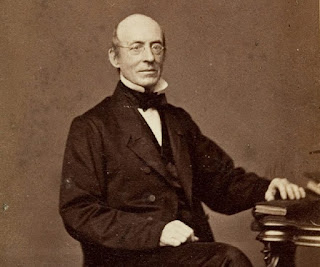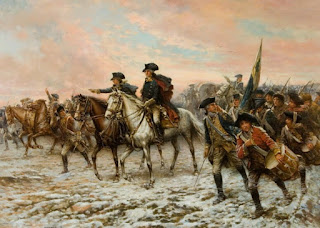William Lloyd Garrison and the Public/Press: Week 9
Many supported Garrison in his slavery abolition movements, landing him positions and meetings to further his beliefs with the likes of those such as Benjamin Lundy, editor of the Genius of Emancipation. Garrison was even on par with Frederick Douglass, one of the most prominent figures in abolition of slavery both then, and now. Garrison was just a piece of the puzzle lasting decades in his lifetime, but centuries overall to completing the freedom of African American peoples.
It
is arguable Garrison contributed to the split in the country’s ideologies’
contributing to the Civil War. Garrison was alive and remained true to his
cause, even throughout the Civil War. His writings notified, educated, and
informed people of the North, the Union, and others that sparked compassion and
altruism to help the enslaved. It was even states that Garrison had done “nothingless than rewrite the Declaration of Independence to include African-Americans”(Osborn).
Every mention of Mr. Garrison that I have seen through research, has not been a critique but rather an appreciation and recognition of his works as an activist, throughout time. Around the time Garrison was alive, there were many documentations, letters, and more that had praised his works.
Through the JSTOR archive and database, The Letters of Mr. William E. Chandler, it was noted that Garrison endorsed Chandler. “…whose unselfish devotion to the cause of human rights, and whose clear vision and calm judgement make his commendation, if not wholly deserved, yet most warmly gratifying” (Chandler, 1878). It was also mentioned that one of his speeches was "the most forthright and extensive statement of American egalitarian principles written between the Declaration of Independence and the Gettysburg Address”(Mayer).
Nonetheless, a large margin of those who knew William Lloyd Garrison and his works were not supportive of him or the cause. Garrison experimented with his writings and actions. He was known for defying the government, and even taking it to the streets to express his thoughts on the animosity that was the United States government. He even denounced the U.S. Constitution, and burned copies of it as a demonstration multiple times in front of large groups of people.
This, along with the red, white, and blue bleeding patriots did not mix well or ideally. There was one instance Garrison was beaten almost to death, and literally dragged through the streets of Boston, Massachusetts tied to a horse because of his demonstrations. It is sensible to say that Garrison was true to the cause, regardless of circumstances.
He continued
to fight for freedom even after this incident. There were even some
abolitionists that still fought against slavery but did not favor the
Garrisonian approach. This is evident in The
Sources of Anti-Slavery Constitutionalism in America, a collection of documents from 1760-1848, that recognized
abolitionist writings. The Garrisonian Critique recognized the
weaknesses and issues in Garrison’s ideology, stating “Garrisonian
constitutionalism seems to be the absurd and self-defeating jumble of sophistries…(Wilentz)”
Even more modernly the press has written about Garrison. Nationwide newspapers, social justice groups, and more have identified Garrisons’ anti-slavery sentiments. As more of history has been unlocked and analyzed, so has Garrison’s ideas.
His actions have been subject to analysis and implementation
alike, so it is safe to say the press itself appreciated Garrison, but the
public was mixed. Even today remains those who oppose abolition and
anti-slavery, and there are those that appreciate it. Garrison was just one of
the first to reveal this.



Comments
Post a Comment